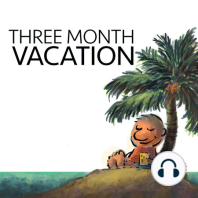1 min listen

How to Get Precise Feedback for your Articles (Lessons from Malcolm Gladwell - Part One)
How to Get Precise Feedback for your Articles (Lessons from Malcolm Gladwell - Part One)
ratings:
Length:
37 minutes
Released:
Jun 9, 2018
Format:
Podcast episode
Description
Most of us aren't really sure how to know if our articles are really good, or even if an idea is good. It gets more complicated when we have a story that we love. Does everyone love it too? Malcolm Gladwell shows us how to get precise feedback and do it in a casual manner. Right click here and ‘save as' to download this episode to your computer. Or read it online: Lessons from Malcolm Gladwell ------------------------ What I learned from Malcolm Gladwell- Part 1 When I was in university, all I wanted to be was like Christopher D'Rozario. Chris was the creative director of an advertising agency called Trikaya Grey. However, I soon wandered away from that dream and then wanted to be like Bill Watterson, the creator of the comic strip, Calvin and Hobbes. But even that dream went into deep freeze as I transitioned to wanting to be a writer and ran into a book by Malcolm Gladwell called “The Tipping Point”. It was my tipping point in a way I loved the way Gladwell wrote, and for the longest time I yearned to know how he came up with so many cool stories. His research seemed exhaustive and to be like Gladwell was one of my big priorities. Then, like everything in life, you move on, and life pulls you in its own current. Even so, recently I watched a series made by Masterclass.com about Gladwell on Writing. I went in expecting to learn interesting stuff. I wasn't disappointed. And here in this series, I would like to share with you, six things that jumped off the screen—so much that I made a note of them, even drew some cartoons for a quick reference later on. What are those six points? Candy vs the main meal How to gauge reader interest with conversation The power of juxtaposed titles Why you need to walk away from drafts What to do when your story enters the world And finally, how to read 1) Candy vs the main meal In 2008, I switched to the Mac after almost 15 years of being on a PC. When people asked me why I'd tell them the story of my presentation I'd been doing a series of presentations for the clients of a radio station. Now, I'm like a helicopter mom when it comes to my presentations, but on this occasion, they wanted the slides in advance. To make sure nothing went wrong, I arrived a whole hour before the event and tested the slides. To my horror, everything looked different. “Who's tweaked my slides?” I asked the technician in charge. “We didn't change anything,” said the guy in charge. “All we did was load your presentation through the Mac software called Keynote. When I looked closer, I realised I was looking in admiration at the slides, rather than frustration. If all they did was run a Powerpoint through Keynote and it improved so much, it sure was my signal to fall head over heels with the Mac. This is akin to what Malcolm Gladwell calls “candy” “There's a difference between the meal and the treat,” he says. “It corresponds to the way people talk about things and think about things”. When people talk about things, they tend to strip it down to something smaller, something enjoyable, even tweetable. The reason, Gladwell continues, “Is because the way you think about something is complex, may have several parts, may or may not be contradictory. Or parts of it may even be remarkably difficult to explain. The things you talk about are those you can talk about. The things that are easy to remember or get across. And usually, they're short—tweetable.” Which is similar to the story of the migration to the Mac I didn't want to move to the Mac. I had a whole suite of programs on the PC, including costly Adobe software and painting software like Painter, which were all purchased for the PC. Moving to the Mac would mean I'd have to ditch all of that software or buy new versions all over again. Plus, there were programs like Corel Draw that at the time (if I remember well) worked solely on the PC. To have to make all of these changes were frustrating. When I explain my story about the Mac, there's a lot more that I'm not even
Released:
Jun 9, 2018
Format:
Podcast episode
Titles in the series (100)
The 70% Principle: Why It Knocks Procrastination Out of the Ball Park: If a job is worth doing, it’s worth doing 70% right. You can always come back to do the 20% later. Yes, read it again, and no, the math isn’t wrong. If you’re going to build a website, a 70% effort is fine. If you’re going to do a presentation... by The Three Month Vacation Podcast